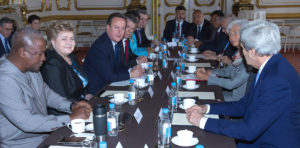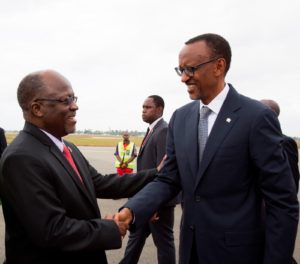by David Brewin
Anti-corruption Summit

Prime Minister Kassim Majaliwa (fourth right) with Prime Minister Cameron at Lancaster House May 2016 (Photo: Prime Minister’s Office)
Prime Minister David Cameron hosted a landmark international Anti-Corruption Summit in London in July which was attended by representatives from 40 countries. The UK Government had applauded the strong anti-corruption drive by the Tanzanian government and invited President Magufuli to participate. However, he had a prior engagement in Kampala at the inauguration of Ugandan President Museveni for another term in office. He sent a strong delegation to London led by Prime Minister Kassim Majaliwa. Apparently only one other African country was invited to the summit: Nigeria.
The meeting agreed the first ever ‘Global Declaration Against Corruption’, and those present committed themselves to work together to expose, punish and drive it out. The Summit Communiqué stated that “no country is immune from corruption and governments needed to work together, and with partners from business and civil society to tackle it successfully”. The Communiqué included concrete actions aimed at exposing corruption; punishing the corrupt; supporting those who have suffered and driving it out. In addition to the Communiqué, countries made specific commitments in their country statements.
A new partnership between Tanzania and the UK’s National Crime Agency was launched to share expertise in audit, financial regulation and anti-corruption investigation. The UK Crown Prosecution Service agreed to assist in establishing Tanzania’s Special Anti-Corruption Division of the High Court. The UK Department for International Development agreed to support Tanzania’s institutions of accountability, including the PCCB and the National Audit Office.
Rwanda and Tanzania

PHOTO President Magufuli greets Rwandan President Paul Kagame as he arrives in Dar-es-Salaam on his maiden state visit (Photo: State House)
The visit by President Magufuli in May to Rwanda attracted large friendly crowds. At the same time a first ‘Tanzania-Rwanda Trade Forum’ was held in Kigali. It lasted for a week and has apparently sweetened relations between the two countries. It also gave Rwandan President Paul Kagame the chance to call on Tanzania to do something about the theft of Rwandan minerals being exported via Tanzania to the outside world. Dar es Salaam remains the main port for land-locked Rwanda, handling 70% of the country’s imports and over 90% of its exports.
Tanzania has installed cameras and boosted security at the port. Rwandan traders who were not allowed access to the container station now have complete access. Rwandan minerals are stored in a special parking zone and transporters are also allowed access to the yards where the containers are held. Minerals are escorted by armed security personnel from the time they arrive to the time they leave the port.
Human trafficking
According to a spokesperson of the Ministry of Foreign Affairs and East African Co-operation, the recent action amongst East African states to stop human trafficking of young women between 18 and 24 years old, who are seeking work in the Far East and Middle East, is not working properly.
After imposing restrictions on Tanzanian jobseekers at all Tanzanian International Airports, a syndicate of human traffickers began arranging flights of young girls through Kenyan and Ugandan airports.
Between March and May, Tanzanian embassies in India, Malaysia and Oman made efforts to repatriate girls who had been forced to work in brothels.
In Britain, newly appointed Prime Minister Theresa May indicated that she wanted to give top priority to stopping human trafficking worldwide.
BREXIT
The result of Britain’s decision to leave the European Union caused surprise and some consternation in Tanzania. Bank of Tanzania’s Governor Benno Ndulu said that Brexit was likely to affect markets but it was a bit early to say and they were following developments very closely.
